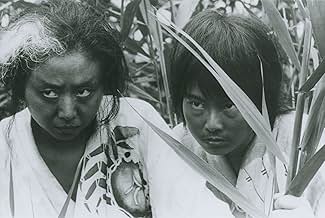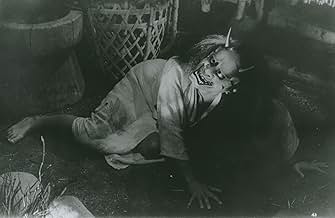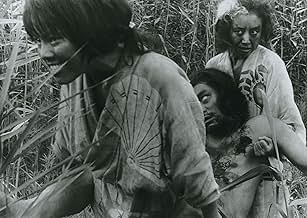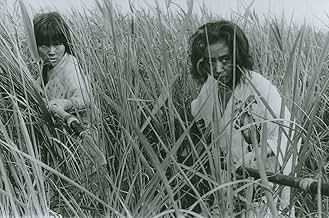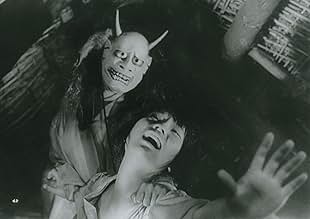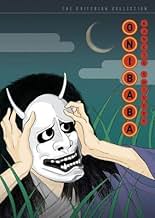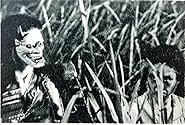NOTE IMDb
7,9/10
23 k
MA NOTE
Deux femmes tuent des samouraïs et vendent leurs biens pour gagner leur vie. Alors que l'une d'entre elles a une liaison avec son voisin, l'autre rencontre un mystérieux samouraï portant un ... Tout lireDeux femmes tuent des samouraïs et vendent leurs biens pour gagner leur vie. Alors que l'une d'entre elles a une liaison avec son voisin, l'autre rencontre un mystérieux samouraï portant un masque étrange.Deux femmes tuent des samouraïs et vendent leurs biens pour gagner leur vie. Alors que l'une d'entre elles a une liaison avec son voisin, l'autre rencontre un mystérieux samouraï portant un masque étrange.
- Récompenses
- 2 victoires au total
Histoire
Le saviez-vous
- AnecdotesOnibaba's literal meaning is demon hag or old devil woman.
- GaffesThe orientation of how Hachi holds his spear while talking to the young woman and the old woman changes from cut to cut. At times he has his arm extended and other times his elbow is bent.
- Versions alternativesOriginally cut in England when released in 1968, though the video releases are uncut.
Commentaire à la une
To describe this film in one word, that word would have to 'wow', or something to that effect. In short, Onibaba is an absolutely spectacular cinematic spectacle, and one that has few equals in it's field. In fact, it's the perfect fusion between art-house cinema and atmospheric horror! Loosely based on a Buddhist fable, Onibaba tells a story of lust, envy, wrath and betrayal which is wrapped up by way of a hideous demon mask. Onibaba is a human drama before it's a horror movie - all the character actions are driven by their various needs and wants, and the all the comeuppance emancipates from there. The characters and their actions are constantly fascinating, and it's that which predominantly keeps the film alive. We follow a mother and her daughter-in-law; a couple that are forced to eke out an existence in war torn Japan by killing passing samurai's and selling their belongings for food. Their existence is upset one day, however, when the son's friend, Hachi, returns from the war to the place where the two women live.
The title of the film roughly translates into English as 'demon woman', and that is an apt title for this story. Although the film doesn't contain any actual demons or other mythical creatures, the real horror comes from the character actions and the film succeeds as a horror film in that way. The atmospheric location, which consists of a huge area covered in reeds, adds weight to film's claim to the horror genre also and the location provides a truly stunning set for this story to take place. The film also features a dark pit, which the women use to dump the bodies of the Samurai they kill, which adds to the fantasy and inventive element of the story. The film is cinematic poetry on many levels, from the bleak yet beautiful cinematography, to the elements of the location mentioned - all the way down to it's central piece of imagery - the mask itself. The mask is the film's centrepiece, and the part's where it features are the most memorable of the movie.
Prolific Japanese director Kaneto Shindô takes us on a tour-de-force of atmospheric direction. He spends a fair amount of time focusing on the reeds blowing in the wind and many of his angles focus on the sky, which will no doubt irritate the less adept viewers amongst us - but the rest of us know that this is a way for Shindô to aptly portray his setting, and every instance when he did that was a delight for yours truly. There are many great shots in this movie, and if you're a fan of technical prowess, Onibaba is your film; and even if you're not, this film is a must see.
The title of the film roughly translates into English as 'demon woman', and that is an apt title for this story. Although the film doesn't contain any actual demons or other mythical creatures, the real horror comes from the character actions and the film succeeds as a horror film in that way. The atmospheric location, which consists of a huge area covered in reeds, adds weight to film's claim to the horror genre also and the location provides a truly stunning set for this story to take place. The film also features a dark pit, which the women use to dump the bodies of the Samurai they kill, which adds to the fantasy and inventive element of the story. The film is cinematic poetry on many levels, from the bleak yet beautiful cinematography, to the elements of the location mentioned - all the way down to it's central piece of imagery - the mask itself. The mask is the film's centrepiece, and the part's where it features are the most memorable of the movie.
Prolific Japanese director Kaneto Shindô takes us on a tour-de-force of atmospheric direction. He spends a fair amount of time focusing on the reeds blowing in the wind and many of his angles focus on the sky, which will no doubt irritate the less adept viewers amongst us - but the rest of us know that this is a way for Shindô to aptly portray his setting, and every instance when he did that was a delight for yours truly. There are many great shots in this movie, and if you're a fan of technical prowess, Onibaba is your film; and even if you're not, this film is a must see.
Meilleurs choix
Connectez-vous pour évaluer et suivre la liste de favoris afin de recevoir des recommandations personnalisées
- How long is Onibaba?Alimenté par Alexa
Détails
- Durée1 heure 43 minutes
- Couleur
- Mixage
- Rapport de forme
- 2.35 : 1
Contribuer à cette page
Suggérer une modification ou ajouter du contenu manquant



